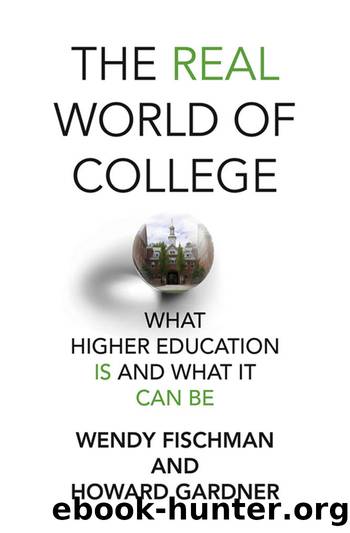The Real World of College: What Higher Education Is and What It Can Be by Wendy Fischman & Howard Gardner

Author:Wendy Fischman & Howard Gardner [Fischman, Wendy & Gardner, Howard]
Language: eng
Format: epub
Published: 2022-02-15T00:00:00+00:00
The same pattern holds true for most of the other major categories of academic rigor which students describe. For example, among students who talk about academic rigor, the second most frequent category is managing academic workload (21%)âboth in terms of managing the work across an entire course load and just in an individual course. One student, aspiring to become an elementary school teacher, comments âI started having a little bit of anxiety from . . . the amount of workload that I had, and I felt like, everything was just, like, bundling up, so I would say that is the biggest issue.â A second student, majoring in natural science, says: âYou know, sometimes school can be overwhelming. I feel like I am drowning. I donât know if that is in the âanxiety departmentâ but itâs like, sometimes it becomes very stressful.â
Again, and notably, the school with the most students who comment on workload (33%) is one of the high-selectivity schools in our sample, whereas the school with the second most students who comment (32%) is one of the low-selectivity schools in our study. Moreover, of the two schools with students who comment the least about workload, one is a medium-selectivity school (4%), and the other is one of the low-selectivity schools in our sample (15%). Clearly, we canât simply assume that the students with the most problems managing workload are the commuting students who often need to balance academic workload with off-campus responsibilitiesâsuch as taking care of families or juggling jobs while trying to find some free hours for study. Though these demands or constraints might be challenging for some students most of the time, or for many students some of the time, it is not necessarily what these students see or cite as the primary or most frequent cause of mental health issues.
In light of a third category of student comments about academic rigor, we are again motivated to check our assumptions. We refer here to compensating for, or overcoming, lack of preparationânot feeling ready for college-level work, or experiencing general difficulty with academics. A first-year student double majoring in biology and Spanish says: âI feel like a lot of people, when they come to [school], they donât understand how demanding the academics are and get stressed out pretty easily.â Another student specifically describes readiness issues related to the transition to college: âStress, because [first-year students who] are not fully transitioned, start stressing out . . . they start getting anxiety because, you know, theyâre too scared to ask for help from anyone.â
Yet another surprise: One might predict that students who complain (or blame) lack of preparation for academic work may not have experienced high-quality secondary educationâand that they are thus more likely to attend a college that is less selective. (Presumably it would be more difficultâthough itâs clearly possibleâto gain admission to a moderately selective or highly selective college without a good high school education.) But, in fact, we find a different pattern: the two schools with the
Download
This site does not store any files on its server. We only index and link to content provided by other sites. Please contact the content providers to delete copyright contents if any and email us, we'll remove relevant links or contents immediately.
| Administration | Assessment |
| Educational Psychology | Experimental Methods |
| History | Language Experience Approach |
| Philosophy & Social Aspects | Reform & Policy |
| Research |
The Art of Coaching Workbook by Elena Aguilar(51165)
Trainspotting by Irvine Welsh(21643)
Twilight of the Idols With the Antichrist and Ecce Homo by Friedrich Nietzsche(18625)
Fangirl by Rainbow Rowell(9229)
Periodization Training for Sports by Tudor Bompa(8254)
Change Your Questions, Change Your Life by Marilee Adams(7761)
This Is How You Lose Her by Junot Diaz(6877)
Asking the Right Questions: A Guide to Critical Thinking by M. Neil Browne & Stuart M. Keeley(5761)
Grit by Angela Duckworth(5605)
Red Sparrow by Jason Matthews(5468)
Paper Towns by Green John(5179)
Room 212 by Kate Stewart(5105)
Ken Follett - World without end by Ken Follett(4723)
Housekeeping by Marilynne Robinson(4436)
The Sports Rules Book by Human Kinetics(4379)
Papillon (English) by Henri Charrière(4263)
Double Down (Diary of a Wimpy Kid Book 11) by Jeff Kinney(4261)
The Motorcycle Diaries by Ernesto Che Guevara(4089)
Exercise Technique Manual for Resistance Training by National Strength & Conditioning Association(4063)
